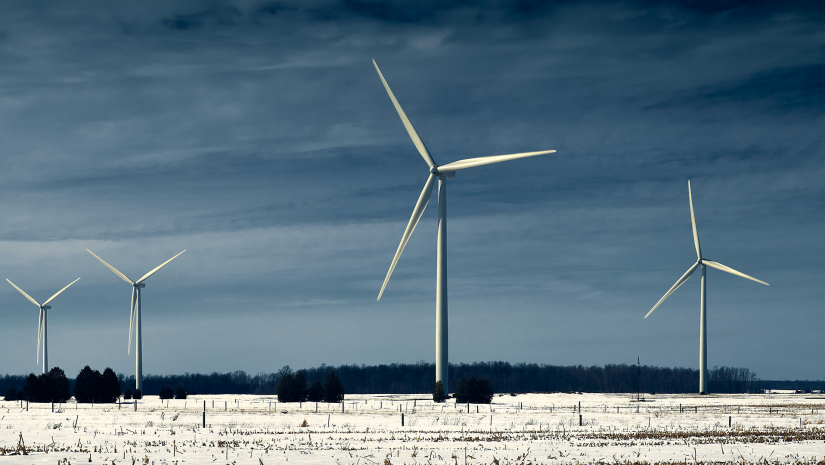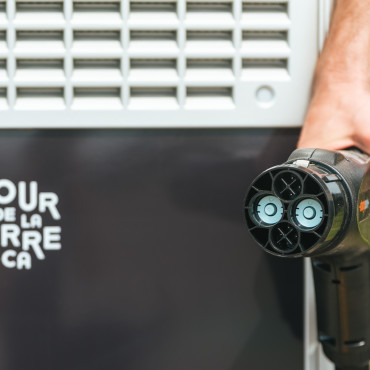Blog & News
Energy wise

Canadians use electricity everyday in almost every aspect of their lives; to cook their meals, charge their electronics, drive to work, cool their homes, and so much more! Wouldn’t it be amazing if all of this electricity came from renewable sources?
What is Renewable Energy?
Renewable energy is derived from natural sources, such as wind, solar, tidal, and geothermal, that are replenished at a rate that is equal to or faster than the rate at which they are consumed. Basically, these sources will never run out! Renewable energy sources can be used to create electricity and then used to power homes, businesses, cars, you name it!
The Canadian Context
In Canada, 82% of greenhouse gases (GHGs) emitted from human activities are created through the production and consumption of energy including transportation, non-renewable electricity production, and heating and cooling buildings. Does that number seem high to you? That’s because it is! Canada’s energy-related emissions are over the global average of 78%. Because of the extreme temperatures, vast and varied landscapes, and dispersed population in Canada, we use more electricity.

Photo credits : Unsplash/Sharissa Johnson
While Canada’s vast landscape means we use more electricity, it also means we have a huge potential for generation of renewable electricity. With vast landscapes come vast renewable resources that can be used to produce energy. Currently, 67% of Canada’s electricity comes from renewable sources, with over 60% of that coming from hydropower. In fact, In 2018, Canada was the 3rd largest producer of hydroelectricity in the world!
What’s our second highest renewable electricity source you ask? Well, solar and wind combined make up just over 5% of Canada’s electricity generation (so, there’s definitely some room for improvement). Luckily, technological advancements are making solar and wind energy cheaper and more viable.
Provincial Differences
In Canada, each province and territory generates and uses renewable electricity differently, depending on the topography of the land and the policies in place. For example, as the majority of our country is landlocked (surrounded on all sides by land), some forms of renewable energy (such as tidal) are only available in certain provinces. Despite the differences in electricity production and consumption amongst the provinces, one type of renewable energy stands out. Yep you guessed it, hydropower! 5 of our provinces and/or territories rely on hydropower for the majority of their electricity.

Photo credits : Unsplash/Melissa Kumaresan
Why Should You Switch to Renewable Electricity?
Have we not yet convinced you to switch to renewable?! Well, let’s discuss the benefits then, of moving towards a more sustainable form of electricity generation!
Environmental Benefits
Increasing the generation of electricity through renewable sources results in a decrease in GHGs by reducing the need for fossil fuel-based power generation. GHGs, such as nitrogen oxide, carbon dioxide, and sulfur dioxide, contribute significantly to climate change, globally. By reducing the emissions of GHGs, the resultant climate change impacts, such as rising ocean temperatures, reduced biodiversity, and increased natural disasters, will reduce in quantity and severity. As well, by utilizing renewable energy sources, consequences of traditional forms of energy (oil spills, smog, polluted waterways, etc.) are dramatically reduced.

Photo credits : Unsplash/Markus Spiske
Social Benefits
The social benefits of increased renewable electricity generation are directly related to the environmental benefits. By reducing GHG emissions and, thus, reducing the negative impacts of traditional energy generation, human health will dramatically improve! In 2018, Canada announced plans to phase-out coal-fired electricity by 2030. Coal is a huge producer of air pollutants that cause smog and phasing it out will result in fewer premature deaths and emergency room visits and improve breathing conditions, such as asthma.
Economic Benefits
Canada’s clean energy sector is growing and with that growth comes more jobs. In 2017, the clean energy sector employed 298,000 Canadians and is expected to continue growing in value by 4.8% every year! Imagine what we could do if we got to 100% renewable-generated electricity in Canada? As well, the environmental and social benefits that occur alongside increased renewable electricity generation have economic benefits for Canadians. With Canada’s updated coal regulations, Canadians are predicted to save $4.7 billion combined from avoided climate change impacts and health benefits.

Photo credits : Unsplash/Ria Puskas
How Can I Adopt Renewable Electricity?
Like we mentioned earlier, your renewable electricity options vary depending on where you live in Canada. I bet you wish there was some sort of resource that combined all of these options, making the choice easy no matter if you are a homeowner/renter, business, or municipality. Oh wait – Earth Day Canada in partnership with Budweiser has created just that!
Are you a homeowner in Ontario looking for options on generating your own solar power? What about a business in PEI that wants to develop an energy strategy? Or maybe you’re a municipality in Saskatchewan and you want to prepare for and take action in the transition to electric vehicles? Well, you’re in luck, we’ve got you covered!
No matter where you are in Canada or who you are, we want to help you on your transition to renewable-sourced electricity. By switching to renewable electricity, you are improving Canada’s environmental and human health and our economy. Visit our new website (available in both french and english!) to learn about how electricity is managed and sourced in Canada and to find all of the information you need to make the switch to renewables.
Sources
- Energy Fact Book 2020-2021, Natural Resources Canada
- Powering our future with clean electricity, Governement of Canada (2020)
- Canada’s clean energy sector is big, growing fast—and largely unknown, Clean Energy Canada (2019)
- What are the Health Benefits of Renewable Energy Choices?, Center for Climate, Health, and the Global Environment at the Harvard T.H. Chan School of Public Health (2015)

Development Officer – Earth Day Canada
April Scholz
For as long as she can remember, April has been an advocate for living a sustainable lifestyle and working together to protect our natural environment. Having grown up in Hamilton, Ontario (the Waterfall Capital of the World) and currently living in London, Ontario (aka the Forest City), April has been surrounded by beautiful natural areas her whole life! If she isn’t at home caring for her plants, you may find her in the woods looking for birds and identifying native trees and plants!
View all posts...Related posts :
Contact us
Earth Day Canada
5818, boulevard Saint-Laurent
Montréal (Québec) H2T 1T3 Canada
Phone : (514) 728-0116
Toll free : 1 800 424-8758
Fax : (514) 303-0248
Email: hello@earthday.ca
2026 © Earth Day Canada. All rights reserved.
Privacy policy · Terms of use · Trademark









